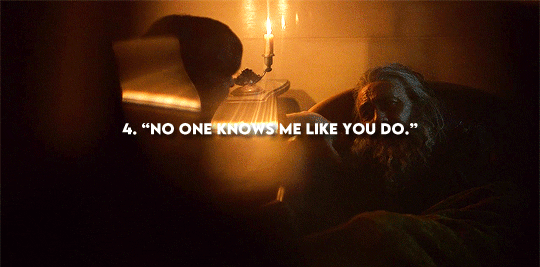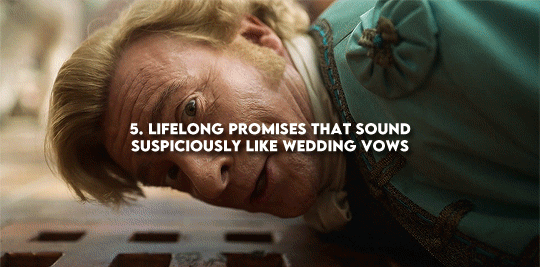#in the good way
Holby NHS: We made a happy lesbian!
RAMC: You fucked up a perfectly good soldier is what you did. Look at it. It’s got anxiety.
the effect of classical tragedy on the prequels really can’t be overstated ok, like the setting was deliberately set up by george lucas so that the actors in the narrative couldn’t possibly defeat palpatine unless they either a) did a complete 180 of their morals and just went apeshit, or b) were saved by a Literal Act of God
I’m not exagerating when i say that this is one of my favourite things about the prequels, just the way they were constructed
The entire narrative of the unknown evil manipulating the hero into isolation. The tragic end of the hero and the good guys, the complete overtaking of the “darkness” leaving both the viewer and the characters in a spot of helplessly watching everything fall apart.
Cause what could they have done? None of the options are logical (or good storytelling in my opinion)
It’s a tragedy and the bad guys win and that’s just not something we’re used to
They have a certain gravitas. “So this is how liberty dies: with thunderous applause,” is the quote that really summarizes the whole shebang, from the Palpatine’s coup to the Separatists to Order 66. Politically speaking, the the tragedy of the prequels is brilliant.
Anakin’s psychology on the other hand? *scratches head* At times it seems plausible. Other times it doesn’t. From attacking Mace Windu to killing younglings! Because of bad dreams and distrusting the council, and desiring to save Padme?!!! Urgh. No matter how confused and upset he was about that, I don’t. Quite. Get it. (Maybe you had to be in his head?) I do believe Anakin could get there. But there are some in-between steps that I think we are expected to infer or something….. Such as the bulk of Anakin’s experiences in the Clone Wars. That’s theater; by reason of production time, stuff gets left out. It doesn’t ring true enough to learn from, or to say definitively that Anakin’s story couldn’t have ended any other way. Especially going by RotS alone.
i don’t pretend to be a psychologist by any means, but there’s several good meta pieces floating around that argue that anakin has some kind of bpd (that i oh so conveniently can’t find now, of course) which could help explain how he goes from 0 to 100 so fast
with regards to the Theatricality, you’re right; plot and characterization are heavily streamlined just due to time constraints, so character motivations tend to be… singular. they’re not flat or underdeveloped characters, and a lot of the time these classic plays will come out with some frighteningly modern insights (which is why they’re constantly in repertory! they’re timeless, babey!) but the hero’s Fatal Flaw, whatever it is (usually stubbornness + [flaw], in anakin’s case, inability to let go) is generally designed to be the exact opposite of what the situation needs.
like, for example, if you swapped hamlet and othello as the protagonists of their respective plays, hamlet would have sussed out iago as a traitor within minutes, and othello would have taken out claudius without a moment’s hesitation, and the rest of the plays’ tragic deaths would have been avoided. but hamlet’s indecision works in tandem with claudius’ moral waffling, and othello’s jealousy makes him easy prey for the equally jealous iago. by the same token, i think, anakin’s inability to let go makes him fearful to take action, which leaves him wide open for palpatine, who has been systematically cutting off any and all other possible avenues for anakin (and the jedi) to take… imo, anyway
honestly i don’t struggle too much with anakin’s characterization at a story level —rage is a kind of fire that burns through better judgement; fear chills personality down to base instinct—but i also think that the almost gravitational momentum of anakin’s downfall is a part of what makes it feel capital-t Tragic. tragedies have a pace as well as a trajectory; they’re inescapable, inevitable, simply because they’re tragedies. “but why” is an essential part of it. the forces working on anakin are narrative. (forgive me, but: “things have gone about as far as they can possibly go when things have gotten about as bad as they can reasonably get.”) miasma spirals. there’s a claustrophobic quality to events as the plot closes on katastrophe. possibilities wither not just by the design of the antagonist but by the nature of the genre. it’s not that it couldn’t have ended another way but that it can’t now? if that makes sense. (“there must have been a moment…”)
there’s something synecdochic going on with anakin / the republic, of course, but there’s also maybe something about the force / the narrative? the force needs balance; the narrative needs bodies. so stuff happens. roll out the ekkyklema.
(i think that’s part of…what you just said? sorry.)
a lot of Tragedy just honestly boils down to bad timing, like if only character a had done action x at point m! but part of the tragedy is that, by the time you realize what you’ve done, it’s too late to turn back, and you are forced to see it through to the terrible, terrible end. there’s echoes of this in the vader comics in his mega sith vision on mustafar, when he is presented with a scenario in which he could have done something different, but waves it away, stating “no. this is all there is”
and i agree that the Demands of the Narrative are probably overriding dynamic characterization here, too. it’s definitely possible to break the rules of Tragedy not just through DEM via deconstruction (i personally can’t think of a good example, but i’m sure someone will chime in with something) but george lucas just clearly didn’t… want to do that. which is valid asf
had to go reread Poetics before coming back to this—as expected, Aristotle is Much better at saying what i mean than i am. (i’m in the malcolm heath translation because that’s what my hand fell on, but i did go through with the kassel preparation open on perseus for word checks! though i mean. contested text, etc. for the record i tend towards the middle understanding of hamartia, as both flaw and error, or as error proceeding from flaw. not one nor the other. katharsis i’m never sure about, only what it feels like. then again i don’t think anyone else is either.)
idle meandering under the cut.
“things come about contrary to expectation but because of one another.” (1452a) that’s sort of what i mean about tragedy having a gravitational pull—i don’t mean to say that there’s no bad timing, or bad luck, or anything like that (“it is probable that improbable things will happen”; 1461b)—but that each event has a discernible cause in the previous text (which is not necessarily to say in the previous action). “bad things happen to good people” is inherently a comic concept, for all that we feel it shouldn’t be; “necessary things happen to great people”—that’s the shape of tragedy, to me. we set the wheels of fate in motion and then they roll on whether we mean them to or not.
the ancient word doc i dump my star wars thoughts into is called “cascade failure and metal fatigue” and i still feel that these are both acceptable metaphors for how tragedy functions: first, that each action limits the possibilities for the next action until there are no further possibilities; second, that what might seem like random chance—a wing falling off an airplane—is, in the right circumstances, nearly inevitable. in the tragic sense, 1. things happen because things have to happen (tragedy needs magnitude; 1451a) and 2. things happen because it is appropriate for them to happen (because they would happen, given such-and-such a situation; 1451b). the mustafar vision is an excellent example, especially because it is an imagined future—vader rejects it not as something that didn’t happen, but as something that wouldn’t. it doesn’t fit the trajectory. he’s tapped in to his own narrative. (and god do i love what star wars has to say about why people keep doing awful things to themselves.)
and just thinking about your “by the time you realize what you’ve done, it’s too late to turn back”: it’s interesting, too—in re the hegelian sense of the tragic hero as trapped between opposing moral rights (and THERE’s an essay waiting to be written: isn’t hegel’s take that tragedy is specifically about restoring balance?), and the attendant reinterpretation of recognition as self-recognition (“what have i done” rather than “oh god that’s my mother”)—that as an aristotlean tragedy, the PT stands on its own, while by hegel’s standards (it seems to me) it needs the OT to be complete, with its return to social order / reconciliation through love. i have been wondering about anakin’s recognition scenes, in the aristotlean sense—because i’m not sure “you killed her” really fits the classicalidea of anagnorisis—and it’s just occurred to me: “you were my brother.” oh! there it is! OH. obviously. now i want to think about the mechanisms of recognition in Empire, too—not just the recognition itself but how it comes about.
ANYWAY, i think the most important question i have been left with is: what performs the role of the chorus? is it the score? i think it might be the score.
texas beating oklahoma and breaking the sooners 40 game win streak was kinda hot ngl






